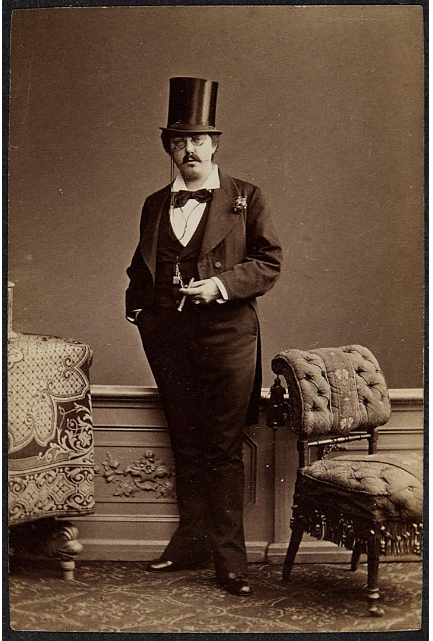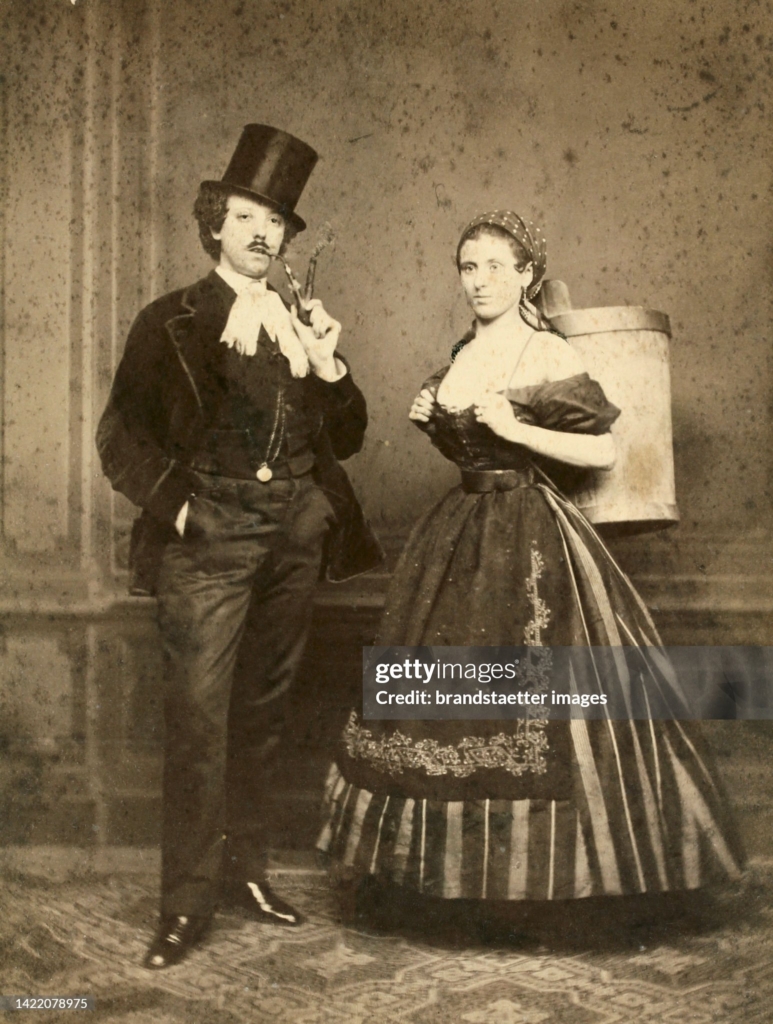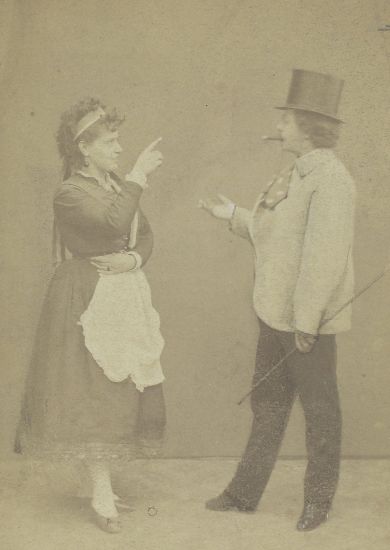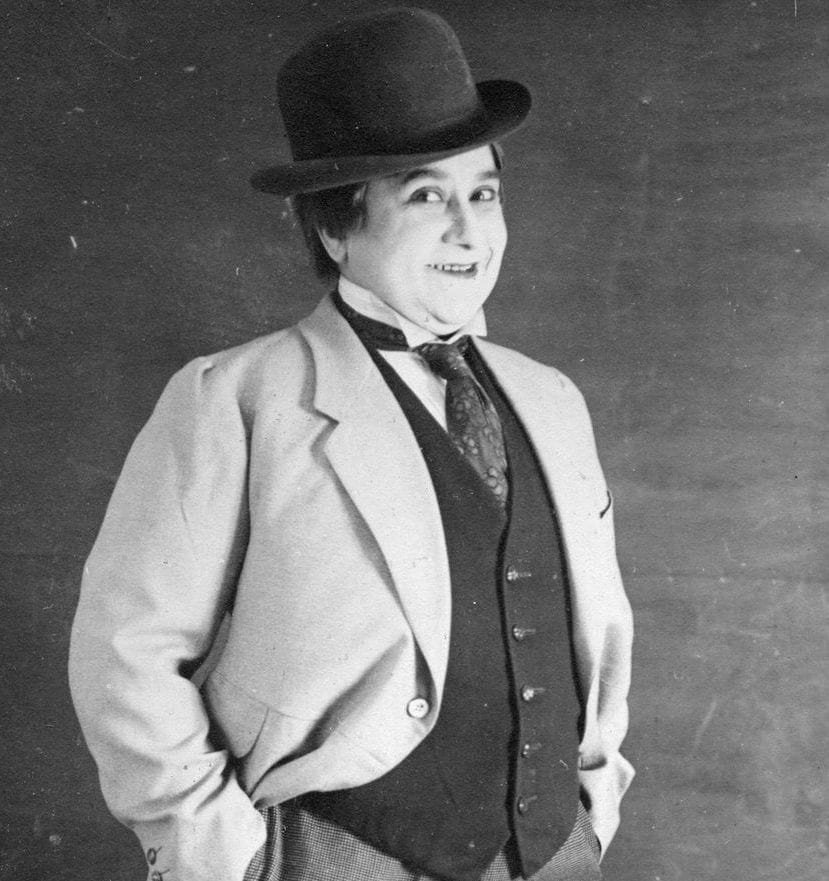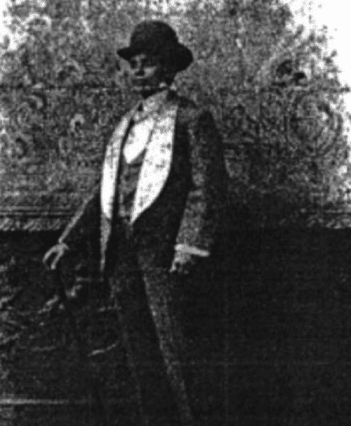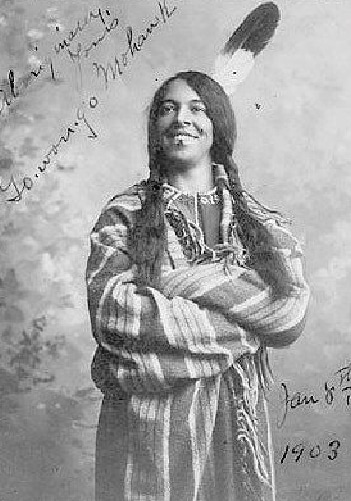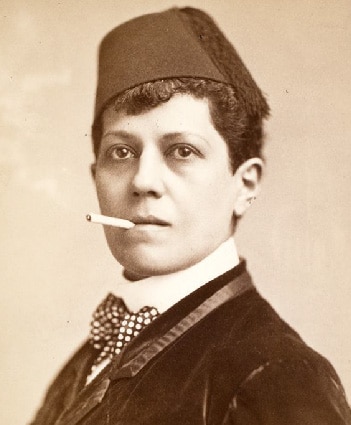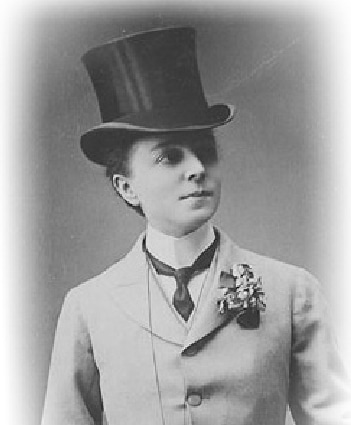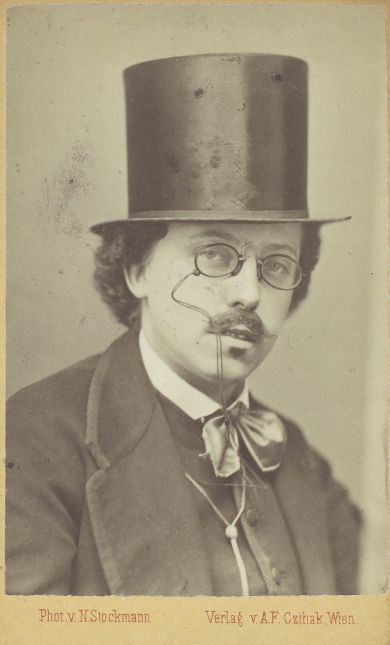
Wien Museum, Inventarnummer HMW 66392/435
Years active
1865 – 1892
Stage Name(s)
Josefine Schmer
Category
Male Impersonator
Country of Origin
AUSTRIA
Birth – Death
1842 – 1904
Bio
Josefine Schmer was a Viennese folk singer, dancer and male impersonator in the latter half of the 19th century particularly well known for her yodeling songs that mocked characteristic city rascals.
Born on February 8, 1842 in Vienna, Austria, Josefine was one of twelve children, the daughter of an accountant and a solo dancer at the Kärntnertor Theatre. She was encouraged by her mother from an early age to make her stage debut at the Theater in der Josefstadt at the age of seven. From 1859, she was engaged as a ballet mistress at the Theater in der Josefstadt, from 1864 to 1865 as a solo dancer at the Theater an der Wien, and from 1865 to 1866 as a dancer at the Theater in der Josefstadt. She also performed at the Thalia Theatre and in the Singspielhalle (music hall) in the Vienna Prater . Schmer remained ballet mistress at the Theater in der Josefstadt until 1867 and at the Harmonie Theatre until 1868.
Through Johann Fürst, the director of the Theater in der Josefstadt and a folk singer and poet, she came into contact with Viennese songs, took lessons from Anton Michael Storch, and trained to become a folk singer. She made her debut as a folk singer in 1868 at Neumann’s Variety Theatre in Budapest, followed by performances with various folk singing groups in Vienna, such as that of Carl Kampf. Her appearances at the Schwarzer Adler (Black Eagle) at Taborstraße 11 in the 2nd district, at Riedl’s Soiree Salon, at the Zum Eisvogel ( Kingfisher) in the Prater, at the Kurmeyer, and at the Goldener Strauß are also documented. These successful performances soon earned Schmer the nickname “the female Fürst ” in the press.
Together with the music hall operator Johann Kwapil, Schmer founded a twelve-member troupe in 1870, which toured Italy and Hungary. A Viennese travel guide for the 1873 World’s Fair praised Schmer as “now the most popular of all Viennese folk and song singers,” who “masterfully performs her roles and always receives well-deserved applause and thunderous cheers.” [1] Until 1889, Schmer was under contract with Bernhard Lautzky, who, after the dissolution of their business relationship, founded the Budapest Orpheum Company .
Schmer received her own operetta license in 1892. This allowed her to employ an unlimited number of performers “for the performance of one-act operettas, farces, and burlesques with singing, drawn from contemporary folk life, as well as individual song recitals and solo scenes.” However, she suffered a stroke that same year and was unable to continue working. The press reported on fundraising campaigns for the unemployed singer, who, however, was unable to return to the stage due to health reasons. Schmer spent her final years in the Lainz almshouse.
Schmer’s specialty was the portrayal of male folk types. The folk song researcher Josef Koller wrote about Schmer in 1931: “It deserves to be noted that she was the first in the last century to realistically embody male figures from the lower classes and to have a favorable influence on the corrupt tastes of the tavern patrons.” [2] One of these figures was the “Viennese Fiaker,” which Schmer created in Budapest; others were the “Viennese Bitz” and the “Loud Schani from the Siebenbrunnerwiesen. ” In his character sketches “Viennese Blood” (1893), Friedrich Schlögl calls Schmer “the most fortunate interpreter of the figures and spirit of the Roßauer- or Erdbergerlände or the former Brilliant Valley .” [3]
Photographs show Schmer in a men’s suit with top hat, bow tie, mustache, cane, cigar and pince-nez – a costume for which Schlögl shows appreciation:
“From the lid of her gleaming top hat to her lacquered ankle boots, Schmer is the most consummate pre-March ‘landlord’s son’ from the Shawlweber district; she is the faithful imitation of ‘Manchester Pepi’ from ‘Dreilaufergasse’ or ‘Wendelstadt’; she is the best portrait of the unruly ‘Schani’ from ‘Althan’ or ‘Wiesen’, and the very embodiment of ‘Nazl’ from ‘Flecksiedergasse’ or ‘Michelbeuern’s Grund’. […] To this costume classicism are added the facial expressions and gestures, which testify to the deepest study, the unconscious shrugs, the sharp elbow swings, the backward-acting right-sided thumb gesture, the taut…” “The posture of the upper body and the quick grabs for the narrow hat brim or the cap visor.” (p. 198)
Regarding the play on gender roles, the guidebook to the 1873 Vienna World’s Fair wavers between approval and disapproval: “Miss Schmerl, the female comedian, a folk singer in men’s clothing – Miss Schmer, a tomboy […] is an eminent couplet and song singer.” [4] Whether men’s clothing was purely a role or also everyday wear for Schmer is uncertain. According to the historian Hanna Hacker, Schmer had a special permit from the police that authorized her to wear men’s clothing, presumably even in private. This likely refers to the biography by Josef Koller from 1931, according to which Schmer “went around only in men’s clothing, even off duty, always smoking a cigar. It was said that the police had granted her a special permit.” [5] However, a brief report in the Neue Wiener Journal of October 28, 1893, states that “the quintessential ‘folk singer in men’s clothes’ does not appear on the street in men’s clothes.” [6]
While Schmer’s gender-role-distorting performances may have been provocative, her roles were considerably less sexually explicit than was typical of her competitors. Schlögl praises this “most chaste mission” in “Wiener Blut.” He specifically highlights Schmer for her endeavor to “put an end to the publicly conducted intellectual ‘feeding of piglets’ with textualized cochonneures […]” [7]
A couplet written by Schmer, preserved as a printed sheet of text in the Freiburg University Library, is entitled “Außi möcht i geh’n!” (I want to go out!). Two verses describe dishonest husbands, while in the third, the husband becomes the betrayed: “He looks like a fool” as the young wife prepares for bed on their wedding night: “On the bed she lays the ivory dentures when going to sleep, / The false hair, the false bosom, calves, hips, for sure, / Yes, listen, when you lay all that on the bed, what’s left for me then? / But out he wants to go, out he wants to go, out he wants to go.” In a second part of the song, other men who want to “go out” from difficult situations are described, including a Viennese man who initially believes himself to be in paradise in a Turkish seraglio; But it “barely takes a month” before he wants to flee – from the overwhelming number of women? This song was so popular that the melody and idea were taken up by the folk singer Karoline Weidinger (1831–1919) in a loving parody: “Eini möcht i geh’n” depicts situations in which shady men stand in front of locked doors or windows, eager to get in.
These and other songs were not merely sung, but yodeled. In “Wiener Blut,” Schmer is described as having a “resonant, powerful soprano.” In contrast, a press report from 1903 describes Schmer as the “mustachioed man with the sonorous tenor voice and perfectly natural, energetic movements” [8] behind whom no one would have suspected a woman. When yodeling, Schmer often performed together with a partner, “Fräulein Wilma,” about whom no biographical information is currently known. An advertisement for the salon “Zum goldenen Widder” in the “Fremden-Blatt” from September 1870 confirms that the two performed a number called “Der Fiaker und seine Geliebte” (The Coachman and His Lover). A photograph of the duo is preserved in the collection of the Wien Museum (Inv. No. 94075/399); on the back, Wilma is handwritten as “Schmer’s yodeling partner.”
Schmer died on December 28, 1904 as a result of a stroke. She was buried in the family grave in the Baumgartner Cemetery.
The Vienna City Library in the City Hall holds two censored copies of stage manuscripts bearing Josefine Schmer’s handwritten ownership mark and stamp. The Austrian National Library preserves a manuscript collection with the inscription “Repertoire of Josefine Schmerger in the A. Conrad Music Hall,” most likely referring to Josefine Schmer. The library of the Center for Popular Culture and Music at the University of Freiburg holds lyrics and sheet music for songs written and/or performed by Schmer.
(Submitted by: Noah Rosa Mayr, Vienna, Austria)

